人教版八年级上册Unit 9 Can you come to my party? Section A Grammar Focus -3c 课件(共26张PPT)
文档属性
| 名称 | 人教版八年级上册Unit 9 Can you come to my party? Section A Grammar Focus -3c 课件(共26张PPT) | 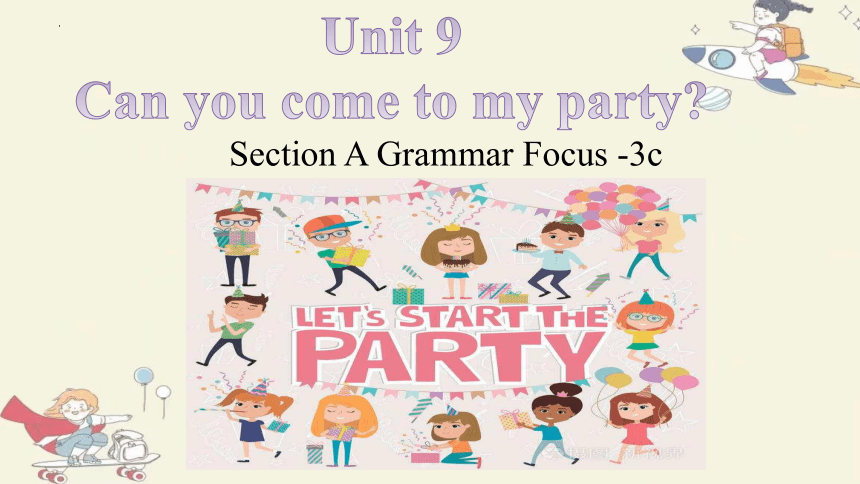 | |
| 格式 | pptx | ||
| 文件大小 | 1.2MB | ||
| 资源类型 | 教案 | ||
| 版本资源 | 人教新目标(Go for it)版 | ||
| 科目 | 英语 | ||
| 更新时间 | 2022-12-13 14:09:54 | ||
图片预览

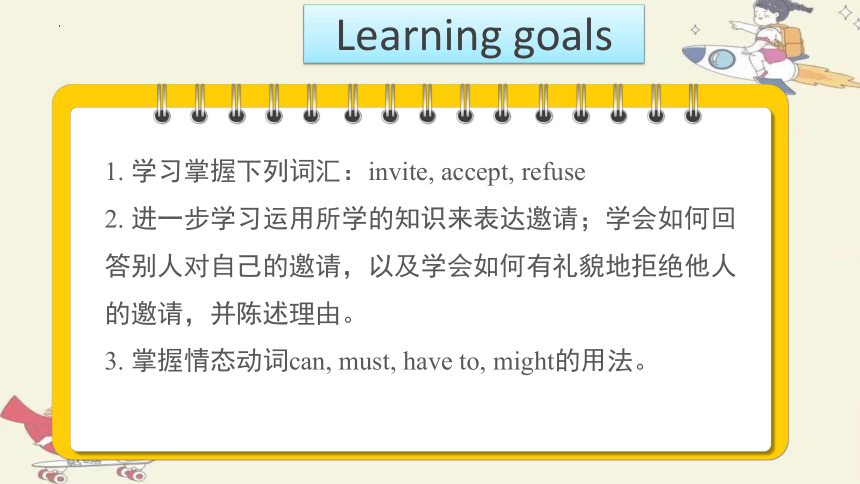

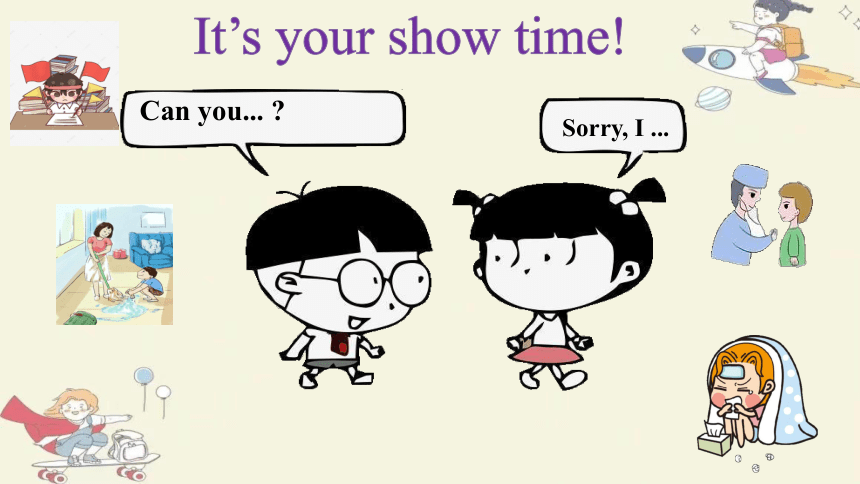
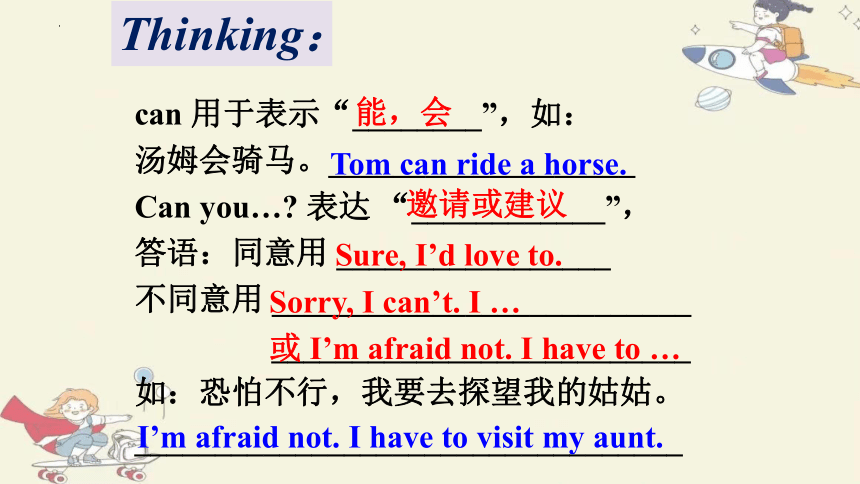
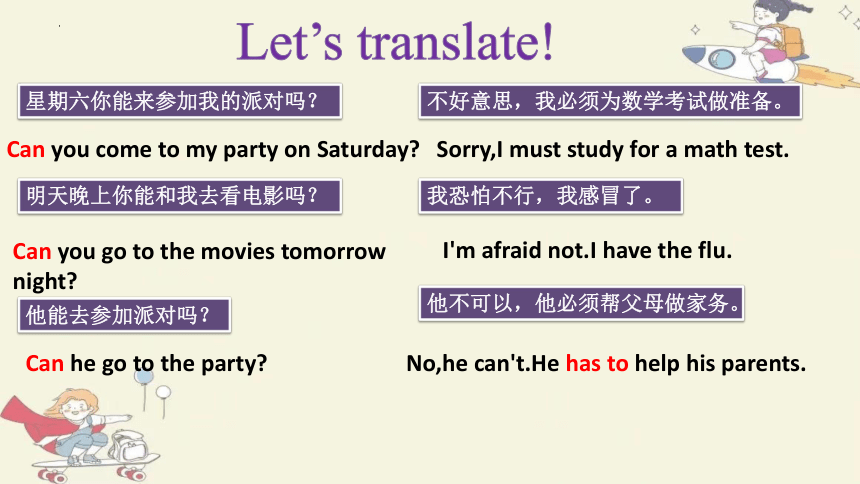
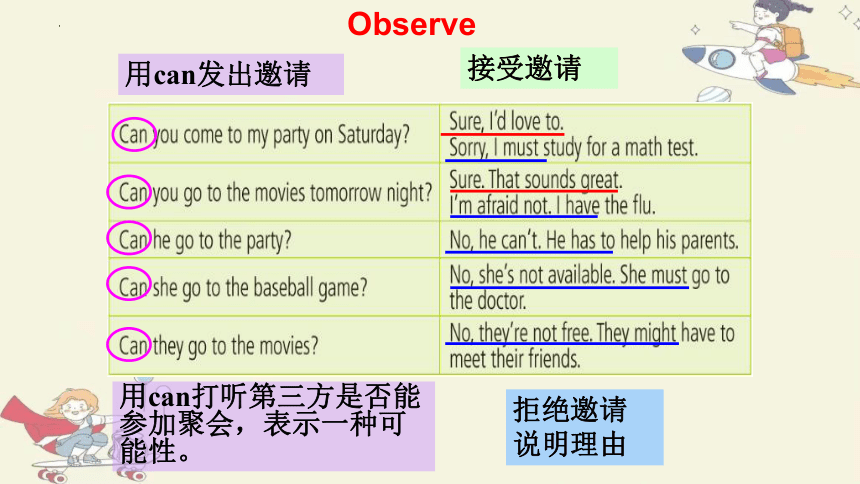
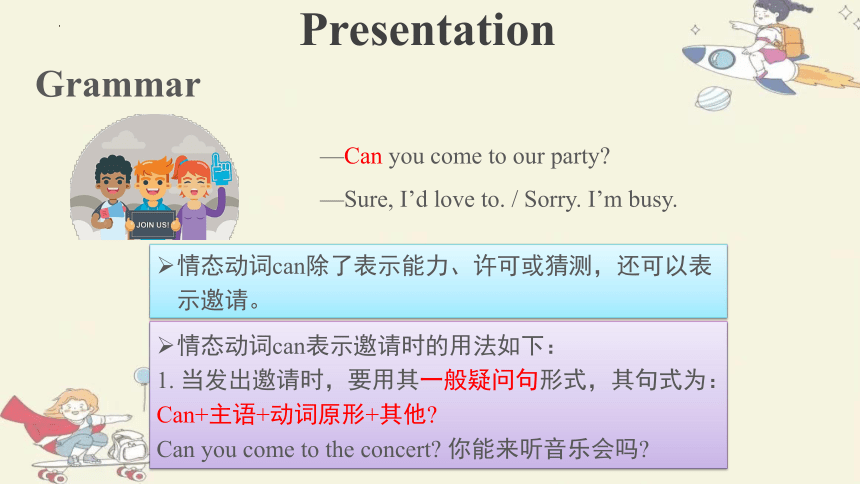
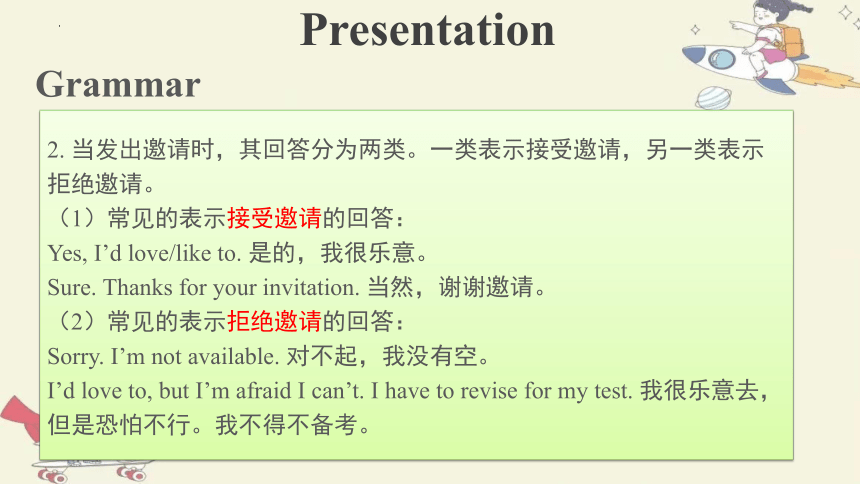
文档简介
(共26张PPT)
Unit 9
Can you come to my party
Section A Grammar Focus -3c
Learning goals
1. 学习掌握下列词汇:invite, accept, refuse
2. 进一步学习运用所学的知识来表达邀请;学会如何回答别人对自己的邀请,以及学会如何有礼貌地拒绝他人的邀请,并陈述理由。
3. 掌握情态动词can, must, have to, might的用法。
Look and say quickly!
It’s your show time!
Can you...
Sorry, I ...
can 用于表示“________”,如:
汤姆会骑马。___________________
Can you… 表达 “____________”,
答语:同意用 _________________
不同意用 __________________________
__________________________
如:恐怕不行,我要去探望我的姑姑。
__________________________________
Tom can ride a horse.
I’m afraid not. I have to visit my aunt.
能,会
邀请或建议
Sure, I’d love to.
Sorry, I can’t. I …
或 I’m afraid not. I have to …
Thinking:
Let’s translate!
Can you come to my party on Saturday
Sorry,I must study for a math test.
Can you go to the movies tomorrow night
I'm afraid not.I have the flu.
Can he go to the party
No,he can't.He has to help his parents.
星期六你能来参加我的派对吗?
不好意思,我必须为数学考试做准备。
明天晚上你能和我去看电影吗?
我恐怕不行,我感冒了。
他能去参加派对吗?
他不可以,他必须帮父母做家务。
用can打听第三方是否能参加聚会,表示一种可能性。
用can发出邀请
接受邀请
拒绝邀请
说明理由
Observe
Grammar
Presentation
—Can you come to our party
—Sure, I’d love to. / Sorry. I’m busy.
情态动词can除了表示能力、许可或猜测,还可以表示邀请。
情态动词can表示邀请时的用法如下:
1. 当发出邀请时,要用其一般疑问句形式,其句式为:
Can+主语+动词原形+其他
Can you come to the concert 你能来听音乐会吗
Grammar
Presentation
2. 当发出邀请时,其回答分为两类。一类表示接受邀请,另一类表示拒绝邀请。
(1)常见的表示接受邀请的回答:
Yes, I’d love/like to. 是的,我很乐意。
Sure. Thanks for your invitation. 当然,谢谢邀请。
(2)常见的表示拒绝邀请的回答:
Sorry. I’m not available. 对不起,我没有空。
I’d love to, but I’m afraid I can’t. I have to revise for my test. 我很乐意去,但是恐怕不行。我不得不备考。
have to 和must的区别
have to “不得不、 必须” 强调客观需要,有人称和数的变化,其疑问式和否定式都需要借助助动词
eg. I have to go to the doctor.
He has to help his parents.
eg. Do you have to go to school in 100 years
eg. I don’t have to go to school in 100 years.
have to 和must的区别
must “必须、一定”,强调主观的义务和必要,没有人称和数的变化。疑问式must提前,否定回答常用needn’t或don’t have to,不用mustn’t
eg. Must you study for the test
No, I don’t have to./No, I needn’t.
▲
can 与 may
② 否定句
This news may not be true. (也许不 = might not )
This news can’t be true. (不可能 = couldn’t)
③ 疑问句
Can this news be true ( = Could)
≠ May this news be true
Can 和may的区别
watch TV, on the weekend, my cousin,
visit my grandparents, practice the violin
1. A: What are you going to do on Saturday
B: I’m not sure. I might __________.
2. A: What are you planning to do after school
B: I don’t know. _________________________.
Complete the answers with might and one of the phrases in the box.
watch TV
I might practice the violin
3a
Practice
3. A: When will you finish the science homework
B: ______________________________.
4. A: Who are you going to the movies with
B: __________________________.
5. A: Are you free to come to my place on Saturday
B: ________________________________.
I might finish it on the weekend
I might go with my cousin
Sorry. I might visit my grandparents
Practice
might表示把握性不大的推测,意为“可能;也许”。可以对现在、过去或将来的情况进行推测,常用于肯定句、否定句中。might表示的可能性小于may。
It might rain tomorrow.(可能性较小,说话者没有把握)明天可能下雨。
Complete the sentences below. Use the words in brackets to help you.
1.Inviting:_____________________________(can /play tennis)
Accepting:_________________________________________
2.Inviting:_________________________(would like to/go to the movies)
Refusing:___________________________________________
Reason:________________________________(might have to)
3.Inviting:_______________________(can/hang out with us tonight)
Refusing:_______________________________________________
Reason:_____________________________________(must)
4.Inviting:__________________(would like to/come to my birthday party)
Accepting:_________________________________________________
3b
3b
Complete the sentences below. Use the words in brackets to help you.
1. Inviting:__________________________(can/play tennis)
Accepting:________________________________
2. Inviting:__________________________________
(would like to/go to the movies)
Refusing:________________________________
Reason:__________________________________
(might have to)
Can you come to play tennis
Sure, that sounds great.
Would you like to go to the movies
I’m afraid not.
I might have to do my homework.
3. Inviting: __________________________________
(can/hang out with us tonight)
Refusing: _________________________________
Reason: _____________________________(must)
4. Inviting: __________________________________
(would like to / come to my birthday party)
Accepting:________________________________
Can you hang out with us tonight
Would you like to come to my birthday party
No, I can’t.
Sure, I’d love to.
I must practice the violin tonight.
Write down everything you have to do next week. Choose a day and time to have a party. Then invite classmates to your party.
A: Can you come to my party
B: When is it
A: Next week, on Thursday night.
B: I'm sorry. I have to study for a math test.
MON.
TUE
WED.
THUR.
FRI.
SAT.
SUN.
3c
I will have a birthday party this Saturday!
Name Accept Refuse (Reasons)
Li Li
Who can come to my party
prepare for an exam
help my parents
go to the doctor
meet my friend
have(has) the flu
Read them loudly!
have(has) to/must
sb +
sb +
1. invite v. 邀请
e.g. They didn’t accept his money.
他们没有接受他的钱。
2. accept v. 接受
New Words
3. refuse v. 拒绝
e.g. refuse to do sth 做某事拒绝
invite sb to +地点 My pen friend invites me to his hometown.
invite sb to do sth He invites me to play tennis on weekends.
Exercise
1. Jack go to school today because it’s Monday tomorrow.
A.have to B.has to
C.have D.has
2. 太多作业了,我们不得不立刻做。
There are 5 children in Sam’s family. His parents have to (make) more money.
B
There is too much homework. We have to do it right now.
make
1. —Must I finish my homework now
—No, you _______.
A.mustn’t B.may not
C.needn’t D.don’t
2. My father has worked for 9 hours. He must tired.
A.be B.was
C.is D.being
2.— you go home right now
—Yes, I must. It’s too late.
A.Have to B.Might
C.Has to D.Must
Exercise
C
A
D
根据汉语意思完成英语句子或对话,每空一词(含缩略形式)。
1. 珍妮今天下午可能得备考数学。
Jenny _______ _____ ___ study for a math test this afternoon.
2. 昨天她患流感了,所以没有去上学。
Yesterday she ____ ____ ____, so she didn't go to school.
might have to
had the flu
Exercise
3. 格雷丝每周六上一节小提琴课。
Grace ____ __ ______ ______ every Saturday.
4. —杰克,你能来参加我的生日聚会吗?
—当然,我非常愿意。
—Jack, _____ ______ come to my birthday party
—Sure, ____ _____ _____.
has a violin lesson
can you
I'd love to
Exercise
Thank you!
Unit 9
Can you come to my party
Section A Grammar Focus -3c
Learning goals
1. 学习掌握下列词汇:invite, accept, refuse
2. 进一步学习运用所学的知识来表达邀请;学会如何回答别人对自己的邀请,以及学会如何有礼貌地拒绝他人的邀请,并陈述理由。
3. 掌握情态动词can, must, have to, might的用法。
Look and say quickly!
It’s your show time!
Can you...
Sorry, I ...
can 用于表示“________”,如:
汤姆会骑马。___________________
Can you… 表达 “____________”,
答语:同意用 _________________
不同意用 __________________________
__________________________
如:恐怕不行,我要去探望我的姑姑。
__________________________________
Tom can ride a horse.
I’m afraid not. I have to visit my aunt.
能,会
邀请或建议
Sure, I’d love to.
Sorry, I can’t. I …
或 I’m afraid not. I have to …
Thinking:
Let’s translate!
Can you come to my party on Saturday
Sorry,I must study for a math test.
Can you go to the movies tomorrow night
I'm afraid not.I have the flu.
Can he go to the party
No,he can't.He has to help his parents.
星期六你能来参加我的派对吗?
不好意思,我必须为数学考试做准备。
明天晚上你能和我去看电影吗?
我恐怕不行,我感冒了。
他能去参加派对吗?
他不可以,他必须帮父母做家务。
用can打听第三方是否能参加聚会,表示一种可能性。
用can发出邀请
接受邀请
拒绝邀请
说明理由
Observe
Grammar
Presentation
—Can you come to our party
—Sure, I’d love to. / Sorry. I’m busy.
情态动词can除了表示能力、许可或猜测,还可以表示邀请。
情态动词can表示邀请时的用法如下:
1. 当发出邀请时,要用其一般疑问句形式,其句式为:
Can+主语+动词原形+其他
Can you come to the concert 你能来听音乐会吗
Grammar
Presentation
2. 当发出邀请时,其回答分为两类。一类表示接受邀请,另一类表示拒绝邀请。
(1)常见的表示接受邀请的回答:
Yes, I’d love/like to. 是的,我很乐意。
Sure. Thanks for your invitation. 当然,谢谢邀请。
(2)常见的表示拒绝邀请的回答:
Sorry. I’m not available. 对不起,我没有空。
I’d love to, but I’m afraid I can’t. I have to revise for my test. 我很乐意去,但是恐怕不行。我不得不备考。
have to 和must的区别
have to “不得不、 必须” 强调客观需要,有人称和数的变化,其疑问式和否定式都需要借助助动词
eg. I have to go to the doctor.
He has to help his parents.
eg. Do you have to go to school in 100 years
eg. I don’t have to go to school in 100 years.
have to 和must的区别
must “必须、一定”,强调主观的义务和必要,没有人称和数的变化。疑问式must提前,否定回答常用needn’t或don’t have to,不用mustn’t
eg. Must you study for the test
No, I don’t have to./No, I needn’t.
▲
can 与 may
② 否定句
This news may not be true. (也许不 = might not )
This news can’t be true. (不可能 = couldn’t)
③ 疑问句
Can this news be true ( = Could)
≠ May this news be true
Can 和may的区别
watch TV, on the weekend, my cousin,
visit my grandparents, practice the violin
1. A: What are you going to do on Saturday
B: I’m not sure. I might __________.
2. A: What are you planning to do after school
B: I don’t know. _________________________.
Complete the answers with might and one of the phrases in the box.
watch TV
I might practice the violin
3a
Practice
3. A: When will you finish the science homework
B: ______________________________.
4. A: Who are you going to the movies with
B: __________________________.
5. A: Are you free to come to my place on Saturday
B: ________________________________.
I might finish it on the weekend
I might go with my cousin
Sorry. I might visit my grandparents
Practice
might表示把握性不大的推测,意为“可能;也许”。可以对现在、过去或将来的情况进行推测,常用于肯定句、否定句中。might表示的可能性小于may。
It might rain tomorrow.(可能性较小,说话者没有把握)明天可能下雨。
Complete the sentences below. Use the words in brackets to help you.
1.Inviting:_____________________________(can /play tennis)
Accepting:_________________________________________
2.Inviting:_________________________(would like to/go to the movies)
Refusing:___________________________________________
Reason:________________________________(might have to)
3.Inviting:_______________________(can/hang out with us tonight)
Refusing:_______________________________________________
Reason:_____________________________________(must)
4.Inviting:__________________(would like to/come to my birthday party)
Accepting:_________________________________________________
3b
3b
Complete the sentences below. Use the words in brackets to help you.
1. Inviting:__________________________(can/play tennis)
Accepting:________________________________
2. Inviting:__________________________________
(would like to/go to the movies)
Refusing:________________________________
Reason:__________________________________
(might have to)
Can you come to play tennis
Sure, that sounds great.
Would you like to go to the movies
I’m afraid not.
I might have to do my homework.
3. Inviting: __________________________________
(can/hang out with us tonight)
Refusing: _________________________________
Reason: _____________________________(must)
4. Inviting: __________________________________
(would like to / come to my birthday party)
Accepting:________________________________
Can you hang out with us tonight
Would you like to come to my birthday party
No, I can’t.
Sure, I’d love to.
I must practice the violin tonight.
Write down everything you have to do next week. Choose a day and time to have a party. Then invite classmates to your party.
A: Can you come to my party
B: When is it
A: Next week, on Thursday night.
B: I'm sorry. I have to study for a math test.
MON.
TUE
WED.
THUR.
FRI.
SAT.
SUN.
3c
I will have a birthday party this Saturday!
Name Accept Refuse (Reasons)
Li Li
Who can come to my party
prepare for an exam
help my parents
go to the doctor
meet my friend
have(has) the flu
Read them loudly!
have(has) to/must
sb +
sb +
1. invite v. 邀请
e.g. They didn’t accept his money.
他们没有接受他的钱。
2. accept v. 接受
New Words
3. refuse v. 拒绝
e.g. refuse to do sth 做某事拒绝
invite sb to +地点 My pen friend invites me to his hometown.
invite sb to do sth He invites me to play tennis on weekends.
Exercise
1. Jack go to school today because it’s Monday tomorrow.
A.have to B.has to
C.have D.has
2. 太多作业了,我们不得不立刻做。
There are 5 children in Sam’s family. His parents have to (make) more money.
B
There is too much homework. We have to do it right now.
make
1. —Must I finish my homework now
—No, you _______.
A.mustn’t B.may not
C.needn’t D.don’t
2. My father has worked for 9 hours. He must tired.
A.be B.was
C.is D.being
2.— you go home right now
—Yes, I must. It’s too late.
A.Have to B.Might
C.Has to D.Must
Exercise
C
A
D
根据汉语意思完成英语句子或对话,每空一词(含缩略形式)。
1. 珍妮今天下午可能得备考数学。
Jenny _______ _____ ___ study for a math test this afternoon.
2. 昨天她患流感了,所以没有去上学。
Yesterday she ____ ____ ____, so she didn't go to school.
might have to
had the flu
Exercise
3. 格雷丝每周六上一节小提琴课。
Grace ____ __ ______ ______ every Saturday.
4. —杰克,你能来参加我的生日聚会吗?
—当然,我非常愿意。
—Jack, _____ ______ come to my birthday party
—Sure, ____ _____ _____.
has a violin lesson
can you
I'd love to
Exercise
Thank you!
同课章节目录
- Unit 1 Where did you go on vacation?
- Section A
- Section B
- Unit 2 How often do you exercise?
- Section A
- Section B
- Unit 3 I'm more outgoing than my sister.
- Section A
- Section B
- Unit 4 What's the best movie theater?
- Section A
- Section B
- Unit 5 Do you want to watch a game show?
- Section A
- Section B
- Unit 6 I'm going to study computer science.
- Section A
- Section B
- Unit 7 Will people have robots?
- Section A
- Section B
- Unit 8 How do you make a banana milk shake?
- Section A
- Section B
- Unit 9 Can you come to my party?
- Section A
- Section B
- Unit 10 If you go to the party, you'll have a grea
- Section A
- Section B
